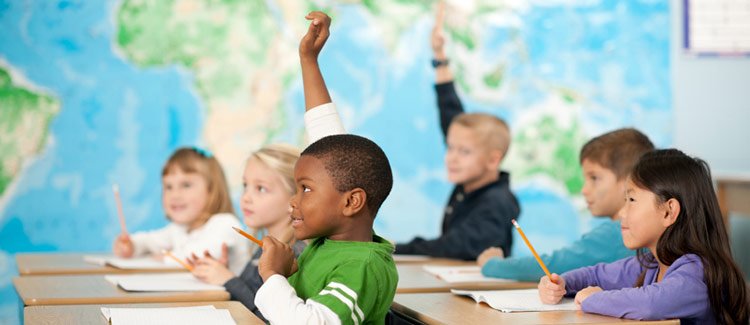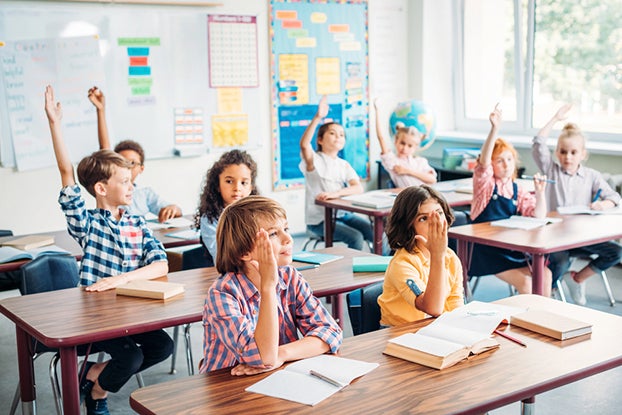Why a Grade School prepares students for high school challenges
Wiki Article
Innovative Discovering Activities in Kindergarten: Enhancing Skills Via Play and Interaction
Imaginative knowing activities in preschool act as foundational experiences for young learners (Grade School Peoria). These activities urge ability growth via lively interaction and social interaction. Kids explore their imagination, enhance communication, and learn valuable social abilities. Each experience contributes to their development in distinct ways. Comprehending just how these activities form early advancement reveals the profound effect of play in education. What particular components make these experiences so efficient in nurturing well-rounded people?The Function of Play in Early Childhood Development
While several might underestimate the relevance of play, it serves as a basic element of early youth growth. Via play, children discover their settings, foster social abilities, and create cognitive capacities. Engaging in unstructured tasks enables them to utilize their creative imagination, try out analytic, and improve their important reasoning abilities. Additionally, play offers a risk-free area for emotional expression, enabling youngsters to navigate their feelings and build strength.Additionally, play urges physical growth as children participate in tasks that boost their motor skills and control. Interaction with peers during play promotes synergy and communication, laying the groundwork for future connections. Private School. Educators and parents identify that play is not simply a leisure activity yet a vital aspect of learning, shaping a kid's ability to flourish and adjust in different scenarios. Ultimately, play enriches kids's lives, preparing them for the obstacles of the future while cultivating a long-lasting love for knowing
Creative Arts and Crafts: Sparking Creativity
Imaginative arts and crafts play a considerable function in firing up youngsters's imaginations and improving their innovative abilities. These activities urge self-expression via different tools, such as painting, drawing, and sculpting. By taking part in hands-on tasks, kids discover to adjust materials, promoting great motor abilities and hand-eye coordination.Creative arts supply a platform for vital and problem-solving reasoning, as youngsters explore different methods and techniques to their creations. This expedition allows them to experiment, make choices, and discover from their experiences.
Cooperation is one more essential element, as kids usually interact on team projects, sharing concepts and resources. This interaction not just builds social skills however additionally nurtures a feeling of area. Inevitably, innovative arts and crafts work as important tools in a preschool setting, promoting cognitive, psychological, and social growth while sparking the innate interest and imagination of young learners.
Interactive Storytelling: Building Language Abilities
Interactive storytelling functions as an effective device for constructing language skills in young kids, as it engages them in the narrative procedure and urges active engagement. Through narration sessions, kids are welcomed to listen, react, and also add to the unfolding story. This interactive layout supports vocabulary growth by exposing them to brand-new words in context.As they take part, youngsters practice necessary communication skills, such as articulation and expression. They discover to sequence events, determine characters, and understand the plot, fostering vital reasoning. Additionally, interactive narration commonly includes aesthetic help, sound effects, and props, which even more boost interaction and understanding.
When children share their own tales, they experience a sense of company and creativity, strengthening their language abilities in a helpful environment. Eventually, interactive storytelling cultivates a love for language and literature, setting a strong foundation for their future scholastic success.
Hands-On Science Experiments: Encouraging Query
Hands-on science experiments offer young learners with invaluable opportunities to make inquiries and discover regarding the globe around them. Participating in straightforward, interactive experiments permits kindergarteners to ask questions, make predictions, and observe results firsthand. These tasks promote inquisitiveness and promote a feeling of marvel, encouraging youngsters to examine the homes of materials, reactions, and natural phenomena.Experiments such as growing seeds or mixing baking soft drink and vinegar not only highlight clinical principles yet likewise improve vital assuming abilities. Youngsters learn to record their monitorings, promoting proficiency and numeracy as they determine, compare, and record information. In addition, hands-on scientific research cultivates a growth attitude, mentor strength as they navigate difficulties and gain from blunders.

Collaborative Gamings: Promoting Synergy and Social Abilities
Involving in joint video games uses kindergarteners an one-of-a-kind platform to establish synergy and social skills while improving the inquiry-based discovering fostered by hands-on science experiments (Grade School). These games encourage kids to work with each other towards common objectives, promoting communication and teamwork. As they browse different difficulties, they learn to share obligations, bargain duties, and deal with problems-- important elements of effective teamworkother
Through structured activities such as group puzzles, relay races, or cooperative narration, kids not just improve their social communications but likewise reinforce their emotional intelligence. They gain understandings into compassion and support, discovering that each navigate to this site child's contribution is important. In addition, these collaborative experiences promote a sense of area within the classroom, creating bonds that expand beyond individual play. By incorporating collaborative video games right into the curriculum, educators can prepare for necessary life skills that will certainly benefit kids in their future educational and social environments.
Often Asked Questions
Just How Can Moms And Dads Assistance Creative Knowing in your home?
Parents can sustain creative discovering in the house by giving diverse materials, encouraging exploration, engaging in imaginative play, asking open-ended questions, and promoting a secure environment where kids do not hesitate to share their concepts and imagination.
What Materials Are Finest for Arts and Crafts Activities?
A selection of products improve crafts and arts tasks, consisting of construction paper, scissors, glue, pens, paints, and recycled things. These resources motivate imagination and enable kids to discover their imagination via hands-on experiences.Exactly How Do Teachers Examine Children's Imagination?
Educators evaluate children's imagination through monitorings, profiles of work, and open-ended projects that encourage self-expression. They assess analytical abilities, originality, and desire to experiment, giving insights into each child's special innovative development and capacities.What Are Some Instances of Outdoor Creative Activities?

How Can Cultural Motifs Be Integrated Into Creative Understanding?
Cultural styles can be integrated right into imaginative knowing by integrating varied tales, music, art, and practices, encouraging youngsters to check out and celebrate numerous histories, fostering inclusivity and understanding while boosting their creative thinking and cognitive skills.Children discover their imagination, boost interaction, and find out important social skills. Through play, children discover their settings, foster social abilities, and establish cognitive capacities. Additionally, play encourages physical development as children involve in Extra resources tasks that boost their motor abilities and sychronisation. Imaginative arts and crafts play a considerable role in sparking children's creativities and enhancing their imaginative abilities. Interactive storytelling serves as a powerful device for developing language skills in young kids, as it engages them in the narrative process and motivates active engagement.
Report this wiki page